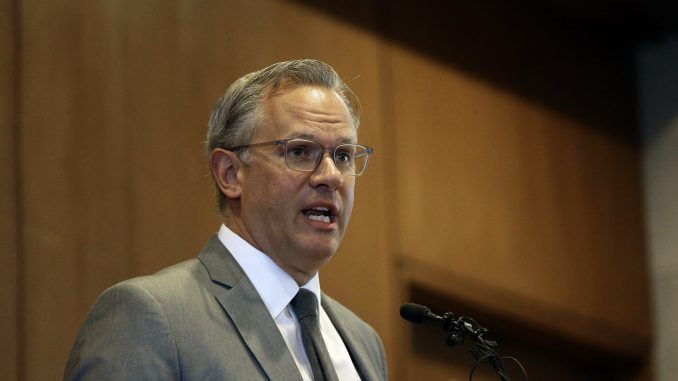
RALEIGH – Judge James Gale said Tuesday that Lt. Gov. Dan Forest “failed to demonstrate he is likely to succeed on any claims for relief” and denied a preliminary injunction in the lawsuit concerning Gov. Roy Cooper’s executive orders.
Cooper’s state attorneys argued in a vitrual hearing last week that the governor acted properly under portions of the Emergency Management Act that don’t require the concurrence of the council. They said the law lets him act unilaterally when he determines local governments are unable to respond effectively in the emergency. Forest counters that Cooper can only act in a limited area without the council’s concurrence.
Democratic Attorney General Josh Stein took to Twitter to write, “we won,” adding Gov. Cooper’s orders remain in effect.
“Today, the court ruled that Gov. Cooper has 100% of the power during a declared emergency and can act unilaterally to deny freedoms to every North Carolinian.
Forest sued Cooper last month, alleging the Democrat’s orders limiting business activities and mass gatherings and mandating face coverings were unlawful because he failed to first get support from the Council of State.
In denying Forest’s request for a preliminary injunction, Judge Jim Gale wrote that the lieutenant governor hasn’t demonstrated he’s likely to win arguments that Cooper has exceeded his authority or that the law is unconstitutional.
“The court finds no statutory language upon which it can base the limitation the lieutenant governor invites — to confine the governor’s exercise of power …. to only a local or regional area,” Gale wrote. “The language requires the opposite conclusion by suggesting that the governor must act beyond the confines of the local jurisdiction when ‘the scale of the emergency is so great that it exceeds the capability of local authorities to cope with it.'”
Cooper and Forest are running for governor against one another this fall.
Forest has criticized portions of Cooper’s response to the coronavirus, such as business closings and setting options for public school reopenings. But the lieutenant governor has said the lawsuit is only about the governor complying with what the law requires before he acts.
Forest said in a news release that since Gale ruled “Cooper has 100% of the power during a declared emergency,” then the governor also “has 100% of the responsibility” for the results. They include permanently closed businesses, poor handling of nursing home outbreaks and deficient outcomes for students, he said.
“Ultimately, the people of North Carolina will make the final decision in November,” Forest said.
Cooper has said his actions have been based on science and health data, and stated without proof that Forest’s legal actions, if successful, could worsen case and hospitalization numbers that have recently stabilized or improved.
“Gov. Cooper has taken decisive action with health and safety measures to save lives,” spokesperson Dory MacMillan wrote in an email. “State officials should lead by example and work to protect North Carolinians instead of putting people’s health at risk.”
The Associated Press contributed to this report.



